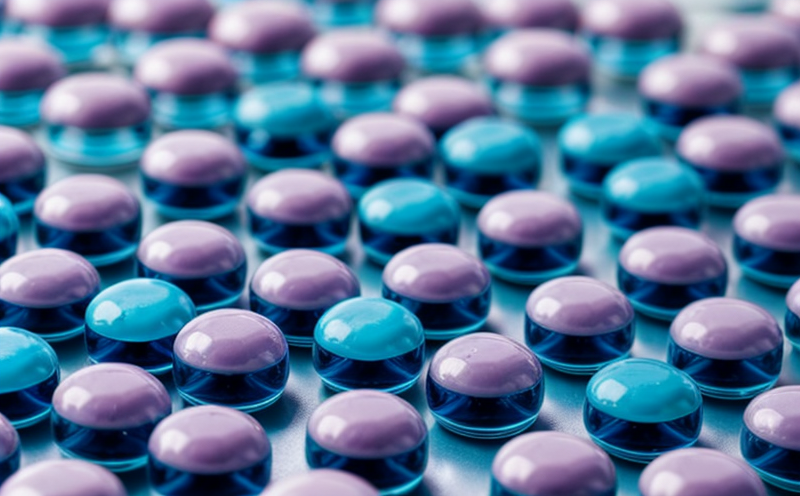EP 2.6.12 Microbial Examination of Non-Sterile Products
The European Pharmacopoeia (EP) 2.6.12 outlines the procedure for the microbial examination of non-sterile pharmaceutical products, which is a critical step in ensuring product quality and safety. This process is essential to detect potential contamination that could compromise the efficacy or safety of medications intended for human use. The primary goal of this service is to provide clients with comprehensive microbiological analysis tailored to the specific requirements set forth by EP 2.6.12.
The scope of our microbial examination covers a wide range of non-sterile pharmaceutical products, including but not limited to tablets, capsules, powders, and liquids. Our laboratory adheres strictly to the guidelines provided in the European Pharmacopoeia, ensuring that all tests are conducted under controlled conditions that mimic real-world storage environments.
Our team of highly experienced microbiologists uses advanced detection methods such as membrane filtration, spread plate techniques, and broth culture systems to identify any microbial contaminants. These methods allow us to differentiate between different types of microorganisms present in the sample, providing a detailed report on their presence and potential impact.
The process begins with thorough sampling of the product under strict aseptic conditions to prevent cross-contamination. Samples are then prepared according to standard procedures recommended by EP 2.6.12, ensuring that each specimen accurately represents the batch being tested. Once prepared, samples undergo either direct plating or membrane filtration followed by incubation at appropriate temperatures.
Incubation periods vary depending on the type of microorganism expected based on historical data and industry best practices. After incubation, colonies are counted manually or using automated colony counters to ensure accuracy. Positive cultures are identified through biochemical tests which help determine specific species present in the sample. This information is crucial for understanding whether contamination has occurred and its nature.
A comprehensive report summarizing all findings is provided within 10 working days from receipt of samples, adhering strictly to EP 2.6.12 requirements regarding timelines. Reports include detailed descriptions of any detected microorganisms along with their concentrations, as well as recommendations for corrective actions if necessary.
| Sampling Procedure | Incubation Conditions | Analytical Methods |
|---|---|---|
| Aseptic sampling under controlled conditions | 37°C ± 1°C for up to 5 days | Membrane filtration, direct plating, broth culture |
| Sterile media | 22-25°C for up to 14 days | Biochemical identification |
| Reagents and equipment validated per EP guidelines | Other temperatures as specified by EP | Automated colony counter |
The results of these analyses play a vital role in maintaining compliance with regulatory standards, protecting public health, and ensuring product quality. By adhering meticulously to the procedures outlined in EP 2.6.12, we ensure that our clients receive accurate, reliable data they can trust when making informed decisions about their products.
Scope and Methodology
The scope of this service includes the detailed examination of non-sterile pharmaceutical products to identify any microbial contaminants that could affect product quality or safety. The methodology involves several steps, each designed to ensure accurate identification and quantification of microorganisms.
- Sampling: Samples are collected from batches of non-sterile products using aseptic techniques to avoid contamination.
- Preparation: Prepared samples undergo either direct plating or membrane filtration followed by incubation at specified temperatures.
- Culturing: Incubated plates are observed for colony formation, and positive cultures are further identified using biochemical tests.
- Analysis: Detailed reports are generated summarizing all findings, including species identification and concentration levels.
The methodology ensures that each step is conducted in compliance with the stringent requirements set by EP 2.6.12, thereby providing accurate and reliable results every time.
Eurolab Advantages
- Expertise: Our team comprises experienced microbiologists specializing in pharmaceutical testing.
- Compliance: All tests are conducted strictly according to EP 2.6.12 guidelines ensuring full compliance with regulatory requirements.
- Speed: Reports are delivered within 10 working days from sample receipt, minimizing delays in decision-making processes.
- Rigor: We use state-of-the-art equipment and validated reagents to ensure precise and repeatable results.
The combination of these advantages makes Eurolab the preferred choice for pharmaceutical companies seeking reliable microbial examination services.
Customer Impact and Satisfaction
- Regulatory Compliance: By adhering strictly to EP 2.6.12, our service ensures that clients remain compliant with international standards.
- Quality Assurance: Accurate microbial examination helps maintain product quality throughout the supply chain.
- Risk Mitigation: Early detection of potential contamination allows for timely corrective actions, reducing risks associated with defective products.
Our customers consistently report high levels of satisfaction due to our commitment to excellence and reliability in every aspect of our service. This is reflected in numerous positive testimonials received over the years.





